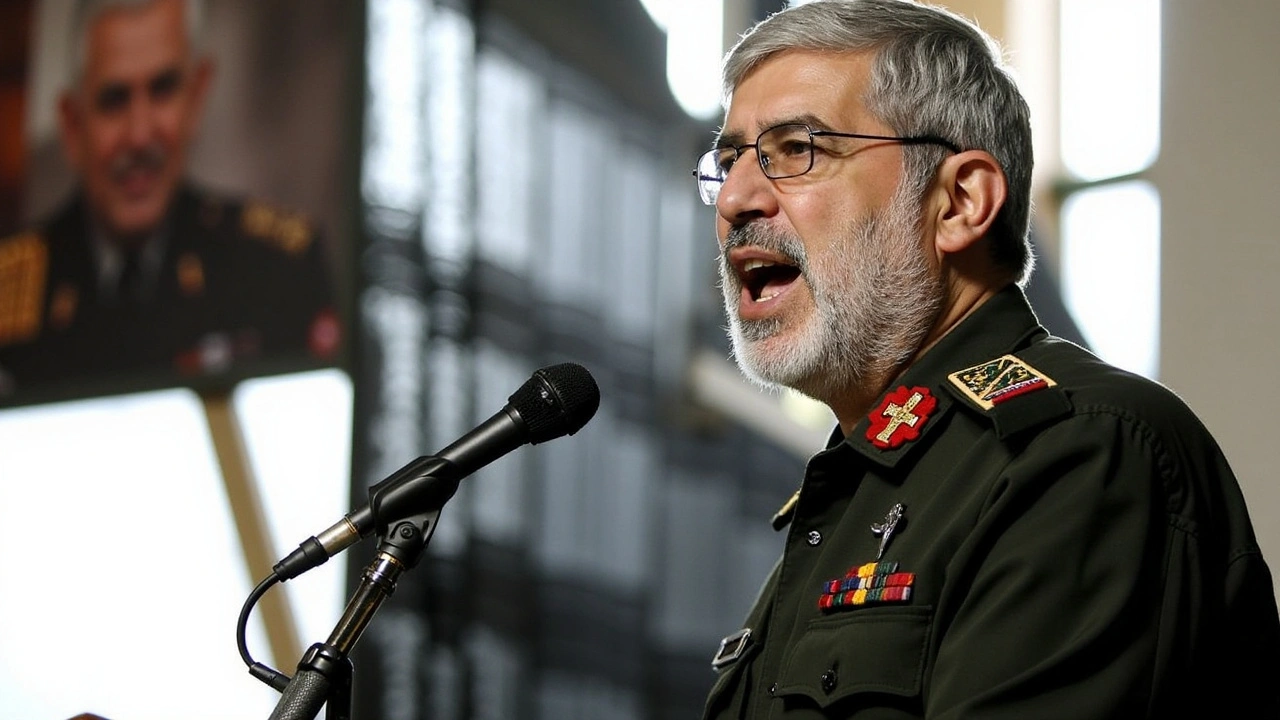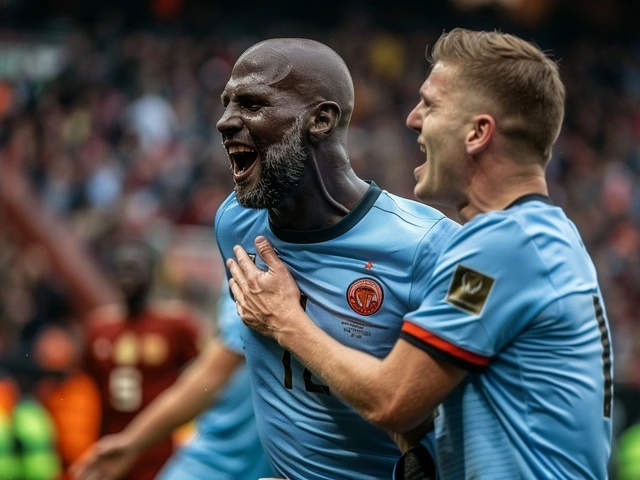Defying Rumors About Esmail Ghaani
In a twist steeped in geopolitical tension and speculation, the status of Iran’s influential military leader, Esmail Ghaani, has become a focal point of international discourse. Over the past few days, numerous media outlets circulated reports claiming that the commander of Iran's elite Quds unit might have been injured or even killed. These reports stem from an unverified incident in Beirut, which supposedly took place last Friday. The narrative unfolds amidst a delicate dance of political intrigue involving major Middle Eastern players.
Amidst Uncertainty, Words of Assurance
At the heart of these swirling rumors was a notable Palestinian-themed conference held in Tehran on October 7. During the event, the host attempted to dispel the mounting uncertainty by conveying greetings purportedly from Ghaani himself. This move was a strategic attempt to quash the speculative flames ignited by earlier unverified reports. On that very Monday, a senior figure within Iran's Islamic Revolutionary Guards Corps Quds Force categorically dismissed the conjecture regarding Ghaani's demise, emphasizing the vitality of the Commander.
An Airstrike in Beirut: A Nexus of Tension
The genesis of these contentious reports is believed to trace back to last week's events in the Lebanese capital, Beirut. It was alleged an Israeli airstrike had targeted the area, resulting in the death of Hashem Safieddine, a senior leader of Hezbollah. Given Hezbollah's staunch support from Iran, particularly through the Quds Force, the suggestion that Ghaani was in close proximity to the attack had dramatic implications. It presented a potential escalation in a region already laden with friction, pitting Israel against Iran-backed entities.
The Legacy of Qasem Soleimani
Esmail Ghaani’s role as the leader of the Quds Force is one imbued with historical weight and expectation. Ghaani stepped into the formidable shoes of Qasem Soleimani, a military figure whose influence had reverberated throughout the Middle East and beyond. Soleimani's strategic acumen and tactical prowess had established him as a linchpin in Iran's foreign policy until his unexpected demise via a US drone strike in early 2020. This assassination, sanctioned under the administration of then-President Donald Trump, marked a pivotal shift and served as a stark reminder of the volatility inherent in these geopolitical machinations.
Between Confirmation and Speculation
The difficulty in confirming the whereabouts and status of individuals like Ghaani underscores the opaque nature of intelligence in conflict zones. When sources clash and concrete evidence is scarce, the line between fact and fiction can blur, leaving room for narratives to be shaped by myriad interests. In the world of international relations, where smoke and mirrors often prevail, the inability to verify such crucial information can lead to escalating tensions, misjudgments, and potential conflicts with far-reaching consequences.
Repercussions and Reactions
The reverberations of these reports have been keenly felt across different diplomatic and intelligence circles worldwide. Speculation regarding Ghaani's fate prompted a flurry of discussions among policymakers and analysts, each assessing how the potential loss of such a significant figure could shift the dynamics within the Middle East. The regional stature of the Quds Force and its alliances across varied factions makes any change in leadership a matter of international interest, tapping into broader questions about power balance and security frameworks globally.
A Complex Web of Allegiances
Undoubtedly, any discourse surrounding the Quds Force intersects with the broader complexities of Middle Eastern politics. Alliances and hostilities in the region are intricate, influenced by the multiplicity of ideological, religious, and ethnic considerations. As Iran remains a key player in this dynamic equation, its military leadership takes on not just operational roles, but also profound symbolic significance. For Tehran, maintaining and projecting strength is fundamental, and figures like Ghaani are central to this narrative of resilience and authority.
The Path Forward
As the dust settles over these reports and their implications, the broader context remains one of vigilance and anticipation. Global observers, as well as local populations, continue to track movements and statements with an eye toward understanding the next potential development. In a region where strategy and symbolism are woven tightly around military conduct, the discourse surrounding Esmail Ghaani serves as yet another chapter in an ongoing saga marked by shadow and substance.
Conclusion: A Watchful World
The world watches on, acutely aware that in the realm of international politics, certainty is a rare commodity. With each new piece of information, the picture morphs and shifts, underscoring the complexity involved in assessing geopolitical narratives. For the observers of Iranian military maneuvers and those invested in Middle Eastern stability, the echoes of these events will resonate well into the future, providing both lessons and warnings on the unpredictable tapestry of global engagement.






16 Comments
Vikas Yadav
October 9, 2024 AT 01:22 AMIt's fascinating how quickly rumors spread when a figure like Ghaani is involved-especially when the region's already on edge. I mean, one unconfirmed airstrike, and suddenly everyone's writing obituaries. I wish media would pause, verify, and stop turning every shadow into a geopolitical earthquake.
Divya Johari
October 10, 2024 AT 15:49 PMIt is imperative to acknowledge that the dissemination of unsubstantiated narratives regarding high-ranking military officials constitutes a grave threat to regional stability. The absence of verifiable evidence must not be conflated with operational vulnerability. Such speculation is not merely irresponsible-it is strategically corrosive.
Aniket sharma
October 12, 2024 AT 13:01 PMLook, I get why people panic when someone like Ghaani’s name pops up in headlines. But let’s not forget-he’s been in this game since Soleimani’s time. If he was gone, Iran wouldn’t be holding conferences in Tehran with his ‘greetings.’ They’d be in full war mode. This is theater, not tragedy.
Unnati Chaudhary
October 13, 2024 AT 15:17 PMThere’s something so human about how we cling to stories when we don’t have answers. Like, we need to know if the guy’s alive or not, like it’ll change everything. But maybe the truth is quieter-we just don’t want to sit with the not-knowing. It’s less dramatic, but maybe more real. 🌿
Sreeanta Chakraborty
October 15, 2024 AT 00:42 AMIsrael has been targeting Iranian assets for years. This is not coincidence. The timing of the Beirut strike, right after Soleimani’s assassination, is no accident. If Ghaani was injured, it’s a strategic win for the West. If he’s alive, it’s a lie to mask failure. Either way, the pattern is clear.
Vijendra Tripathi
October 15, 2024 AT 03:22 AMMan, I’ve seen this movie before. One rumor, three news sites, ten reddit threads, and suddenly the world’s ending. Ghaani’s probably sipping chai somewhere in Qom, laughing at how easy it is to spin fear. The real threat isn’t him-it’s how fast we panic when we don’t understand the game.
ankit singh
October 16, 2024 AT 12:18 PMThe Quds Force operates in shadows by design. If Ghaani were dead, Iran would announce it with full honors. If he were injured, they’d delay to avoid morale collapse. Silence is the most powerful statement here. No confirmation = intentional opacity.
Pratiksha Das
October 17, 2024 AT 08:48 AMwait so is he dead or not?? like i read like 3 diff articles and they all say somethin diff?? like why cant they just say?? also i think he was in beirut last week?? idk
ajay vishwakarma
October 17, 2024 AT 14:22 PMPeople forget that Ghaani doesn’t need to be in the spotlight to be effective. He’s the quiet architect, not the loud general. His value isn’t in being seen-it’s in being steady. Iran’s strategy has always been patience. This rumor? Just noise.
devika daftardar
October 18, 2024 AT 16:33 PMlife is so weird right?? one day you're sipping chai the next you're a headline. i think we all need to breathe. no one really knows what's going on and that's okay. maybe the truth is just… quiet. 🌙
fatima almarri
October 20, 2024 AT 12:36 PMThere’s a profound asymmetry in how power operates here. The Quds Force thrives on ambiguity. Ghaani’s silence isn’t weakness-it’s doctrine. The West expects spectacle. Iran delivers strategic stillness. That’s why we’re all scrambling to interpret whispers.
deepika singh
October 20, 2024 AT 20:22 PMOkay but imagine being Ghaani right now-everyone’s panicking over your health while you’re just trying to get your coffee without a press corps outside your door. 😅 Honestly? I respect the chill. Let the man breathe.
amar nath
October 20, 2024 AT 21:05 PMIt’s wild how much symbolism is packed into one man. Soleimani was a myth. Ghaani? He’s the quiet keeper of the flame. Not flashy, not viral, but the one who keeps the machinery running. Maybe that’s the real power move-being the unbreakable background.
Pragya Jain
October 21, 2024 AT 04:08 AMIran’s lying. They always lie. Ghaani is dead. The conference was staged. The greetings were recorded months ago. This is psychological warfare. Don’t be fooled. The West is weak and they know it. This is their last gasp.
Shruthi S
October 21, 2024 AT 21:38 PMhope he's okay 😔
Neha Jayaraj Jayaraj
October 23, 2024 AT 10:21 AMOMG SO THIS IS WHAT HAPPENS WHEN YOU DON’T WATCH THE NEWS?? I JUST SAW A TIKTOK THAT SAID GHAANI WAS BURIED IN A SECRET TUNNEL UNDER TEHRAN WITH 7 BODY DOUBLES?? 🤯 IS THIS REAL?? I NEED TO KNOW!!